Opinions
Trans Chicanas and Latinas experience exclusion from umbrella term
‘It feels like being a guest in your own home’
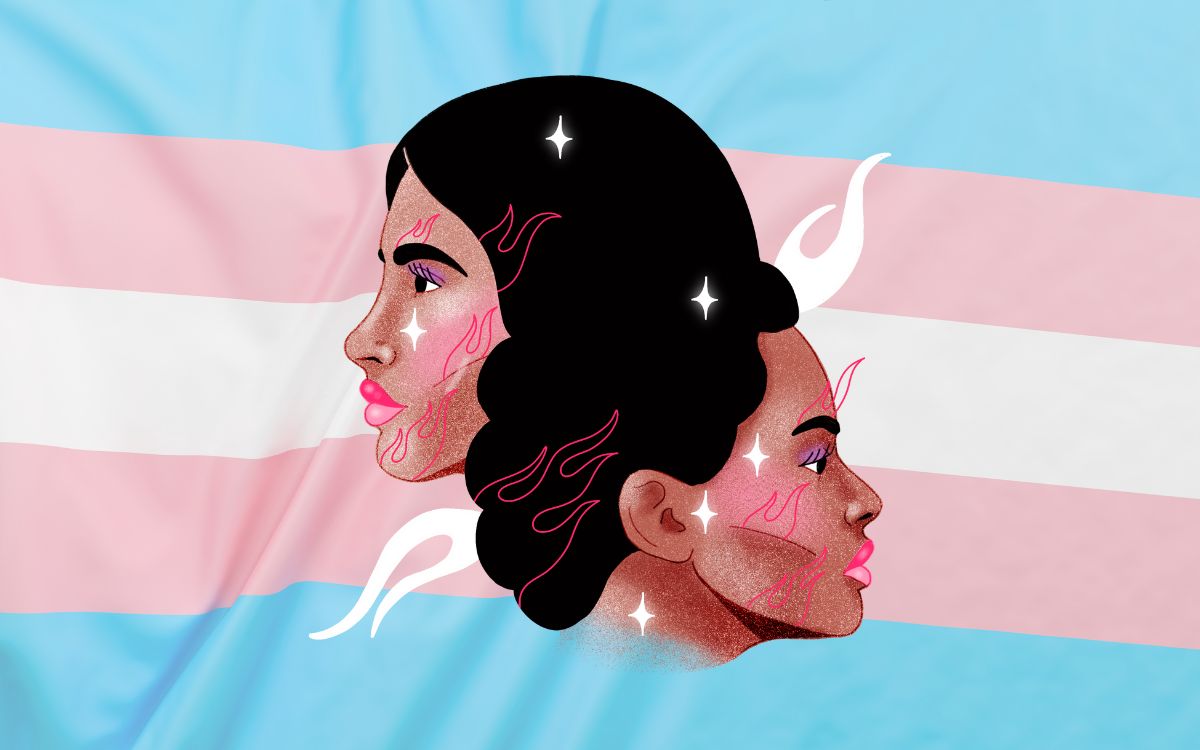
The trans umbrella represents inclusivity. But who is actually being accounted for under this term? Nonbinary, gender nonconforming, queer, genderqueer and genderfluid people– everyone but trans Chicanas and Latinas.
In a time where LGBTQ+ lives are constantly being scrutinized and contested, it is crucial to protect trans Chicana and Latina identity, by not using language that diminishes our visibility or erases our existence. There is a need for an intersectional definition of transgender.
Besides, we must ask ourselves: for a movement so keen on diversity, why the need to squeeze an ever-expansive number of gender identities into a singular category?
Trans scholar T. Benjamin Singer warns us of the trouble of the trans umbrella in an article published by Transgender Studies Quarterly at Duke University.
“Umbrellas should arrive with a disclaimer,” Singer cautions. “One size does not fit all.”
And it is true. Boxing me into the trans umbrella eradicates the multifacetedness and complexity of my trans Chicana and Latina identity, which is why I agree with Singer’s ‘one size does not fit all’ argument.
I mean—when has that ever been true?
Trans Chicanas and Latinas do not fit neatly into mainstream definitions of transgender that render trans identity as a limitless umbrella term capable of holding any and all gender identities, mainly because trans Chicanas and Latinas embody a unidirectional gender identity.
To force such a loose definition on trans Chicanas and Latinas, would be to erase the intersectional identity of the brown trans female subject, and therefore, erase trans Chicanas and Latinas altogether.
Singer is one of many voices cautioning against the umbrella metaphor. Trans Chicana and Latina Eden Estrada–famously known as Eden the Doll–touched on the topic of the trans umbrella in an interview with YouTuber Matt Cullen. “There’s also a lot of negative stigma now because of how big the umbrella term is,” Estrada admits.
I have experienced the stigmatization Estrada mentions, which usually manifests itself in being branded as someone who is unstable, perverse, and confused. This form of trans de-legitimacy is doubly harmful to trans Chicanas and Latinas because we contend with racism on top of transphobia.
Equally concerned about the trans umbrella argument is Dr. Natalia P. Zhikhareva, a clinical psychologist and trans specialist, who wrote the letter that expressed my readiness for sex reassignment surgery in 2020.
“Transgender is a huge, huge umbrella term right,” said Dr. Zhikhareva in a video posted to her YouTube channel. “And that’s another problem with the language that we have today. We’re using the word trans and transgender … to cluster everybody underneath, and I personally think that’s quite problematic.”
Many trans Chicanas and Latinas fit into the gender binary system, however, not without posing challenges to cis-heteronormative spaces. Trans Chicanas and Latinas embody a form of transness with a specific landing locale–meaning that for many trans Chicanas and Latinas transition looks like undergoing social and medical transition from male to female, and while there might be stops along the way, the end point is typically womanhood.
A video posted by the Trans Latin@ Coalition website titled “Dying to be a Woman, Morir Por Ser Mujer,” Dr. Johanna Olson-Kennedy, and even the CEO and Founder of Trans Latin@ Coalition, Bamby Salcedo, spoke on the urgency for many trans Latinas to medically transition and embody a form of cis-femininity and womanhood.
The problem with a definition of transgender that deems it an umbrella term is that it lacks nuance. Transgender is a gender category contingent upon time, geography, and racial or ethnic backgrounds.
As a self-identified trans Chicana and Latina, who lived as a hyper-femme, gay man for over five years, I have often felt misplaced when gender variant people, genderfluid, or those who do not subscribe to the gender binary are placed within the transgender category.
It feels like being a guest in your own home.
Make no mistake. This critique of the trans umbrella metaphor is not a call to exclude gender identities that don’t meet a laundry list of requirements to be transgender nor an attempt to start a conversation surrounding the construction of qualifications for being transgender.
My critique simply highlights the fact that a universal definition of transgender that deems it an all-inclusive gender category is not representative of the intersectional identity of trans Chicanas and Latinas, and, in fact, erases Chicana and Latina trans-ness.
Opinions
Mattachine Society in LA marks 75th anniversary
Seven gay men met in Edendale home on Nov. 11, 1950.

On Nov. 11, 1950, Veteran’s Day, seven homosexual men met in a home in what was then called the Edendale section of Los Angeles, now referred to as Echo Park. They came together, secretly, recruited by Harry Hay to found the Mattachine Society, the commencement of the long march to freedom by LGBTQ people in the United States. A statue needs be erected in L.A. to honor those seven men: Hay, Bob Hull, Chuck Rowland, Rudi Gernreich, Dale Jennings, James Gruber, and Konrad Stevens.
I still get chills as I read the oath of initiation taken into the Mattachine that day to the sounds of Pachelbel’s “Canon” softly playing in the background, an oath eventually heard around the world: “We are sworn that no boy or girl, approaching the maelstrom of deviation, need to make that crossing alone, afraid and in the dark ever again.”
In that oath about the “boy or girl,” the word “deviation” reverberates through a thousand years in the West of hetero supremacy and enforced heterosexualism with all that implies. All LGBTQ people were once that “boy or girl.” Thus began a core principle of LGBTQ community — we assume responsibility for each other.

Nov. 11, 2025, marks the 75th anniversary of that moment. As far as my information at this time, as a gay elder, I’m embarrassed to report to those seven gay ancestors: not a single event is planned in L.A. to commemorate that historic date, just as L.A. Pride occurred in WeHo on the 50th anniversary of the Stonewall Rebellion, the reason for Pride’s existence, without ever mentioning a word about Stonewall.
Why is that erasure of important LGBTQ history happening in L.A. and elsewhere? In previous articles in the LA Progressive, I have tried to explain that erasure by the Elite Capture of the LGBTQ community with top-down leadership, a total blackout of local news or investigative journalism, community members becoming spectators rather than participants, and new community moral values that reduce everyone to donors and consumers.
While a very short-lived effort was made in Chicago in the 1920s, which was quickly broken up by the police, the Mattachine represents the first successful attempt in the U.S. at organizing homosexual men and women. They used the oppressor’s word, “homosexual,” to describe themselves. After World War II, several of the men had been members of or had flirted with the U.S. Communist Party or were members of other progressive organizations, where they learned organizing skills, analysis of social problems, and secret organizing. It was that secret organizing, as necessary as it may have been, that became its Achilles’ Heel. Hay was kicked out of the CP by CP leader Gus Hall’s purge of known or suspected homosexual men and women after World War II.
The name “Mattachine” came from the word “matticini,” one of the names for jesters in royal courts of medieval Europe which Hay deduced from his research were homosexual men.
The Mattachine is important for more than just existing for three years (1950-1953). In its original organizing “manifesto,” written by Hay, for the first time in U.S. history, homosexuals identified themselves as an oppressed minority group. The document also declared that a hidden homosexual culture existed. Also, it implied that collective political action was needed. That collective political action eventually came from Mattachine’s grandchildren with the fire and fervor of the collective action of the Gay Liberation Revolution (1969-1985) — the Great Awakening. Will Roscoe’s “Radically Gay” will introduce you to this valuable historical written material of the Mattachine.
The Mattachine was a top-down organization based on a secret model of five levels that had been used by the Free Masons in 15th century Europe and later employed during World War II by the French Resistance. The original seven members were on level-five and newcomers on level one, not knowing who was on the levels above them. Such organization, it was felt then, was necessary due to the viciousness and life destroying consequences at that time by U.S. hetero supremacists if homosexual identity were ever made public. Until the 1969 Stonewall Rebellion and its aftermath, sane paranoia based on individual protection and survival characterized homosexual reality.
The Mattachine’s most important contribution then was the use of private discussion groups that gave gay men and lesbians, for the first time, an opportunity to talk with each other about their lives and how hetero oppression was directly impacting them. But these groups often met cautiously.
There was one discussion group in an apartment building in Hollywood that required members to arrive as fake male-female couples, the men wearing male attire and the women in dresses, lest the neighbors suspect that a homo group was meeting next door and alert the LAPD, who could soon be knocking on the door.
By late 1952-early 1953, it was reported that Mattachine had created almost a hundred discussion groups in California with about 2000 participants, a stunning achievement for the early 1950s. There were also Mattachine organizations happening in New York City; Washington, D.C.; San Francisco; and elsewhere. The discussion groups by then were taking on a more grassroots character with a wide range of people from various political proclivities and social classes, but, given the enforced racial segregation practiced in L.A. then, virtually all were white. There were whispers about their own publication.
Then, in March 1953, all hell broke loose when Paul Coates, a widely read newspaper columnist in the U.S., reported publicly for the first time the existence of the Mattachine in Los Angeles and the ties of some of its organizers to the Communist Party during the Red Scare period. I speculate that Coates was tipped off by J. Edgar Hoover and the FBI who, after their first priority, the Red Scare, focused on their second priority, the Homo Scare.
The Mattachine was thrown into turmoil, not knowing whose outing was next, and the seven level-five men unmasked themselves.
At a meeting of the Mattachine at the First Unitarian Church, then on Crenshaw Boulevard, in the Spring of 1953, Hay and other founders resigned in the best interest of the organization, which was taken over by conservative Hal Call and moved to San Francisco, which is a sad story for another time. In my many dialogues with Hay about this period, he always referred disdainfully to the San Francisco group as the
“Second Mattachine,” to clearly differentiate it from the first.
Out of that chaos, in Los Angeles was formed ONE, Inc., which ushered in the conservative, Republican-led Homophile period (1953-1969), centered in Los Angeles, that recorded successes and failures which I have written about previously in the L.A. Progressive.
One essential way of understanding the Mattachine and Homophile periods is through the lens of the historiography of liberation movements. Both the Mattachine and Homophile years represented what is seen as “secondary resistance,” which involves the preparation of an oppressed people for liberation through discussion, writing, education, and some organizing of an elite nature. The “Big Bang” of the Gay Liberation Revolution was “primary resistance,” which involves direct action against the power of the oppressor, replaces it, and proactively creates a new sense of community free of the previous oppression. Or so they say.
One of my teachers, Malidoma Some, taught me about the importance of honoring ancestors as an essential ingredient of maintaining a healthy community. He also taught me about eldering. Among the Dagara people in Burkina Faso, from which he came and was an initiated shaman and initiated elder (also with two earned Ph.Ds. from the Paris Sorbonne University and Brandeis University), one of the important roles of elders was to scold the village for any shortcomings in fulfilling their responsibilities. Only elders had the authority to do that scolding.
As a Gay Tribal Elder, I send out a potential scold particularly to functioning and conscious LGBTQ adults and youth in the L.A. community. You are the boy or girl the Mattachine swore to protect. You are the great, great grandchildren of those pioneers. You have ancestor responsibilities. You might bring shame to a community by disregarding that important legacy. Being me, I also warmly say to you that you can always redeem yourselves. The 75th anniversary year of the Mattachine is just beginning on Nov. 11, the founding date in 1950. There is time during this coming year to be accountable in some notable way.
As the remarkable poet Kevin Young wrote recently, “the dead won’t let/us be.”
Don Kilhefner, Ph.D., has been a gay community organizer for the past 60 years in Los Angeles, nationally, and internationally.
Commentary
Cities can’t improve the future with yesterday’s rules
California cities can’t keep building 21st-century infrastructure with 20th-century rules. It’s time to give local governments the flexibility to deliver for the people they serve.

Editor’s note: This piece is a follow-up to Councilmember Erickson’s August 12 op-ed, “Why California Must Remove the Roadblocks to Safer Streets,” in the Los Angeles Blade.
When I wrote earlier this year about why California must remove the roadblocks to safer streets, I focused on what local governments like West Hollywood can do to fix our own processes. At our October 20 Council meeting, I’m advancing a proposal that will streamline how we plan and deliver infrastructure projects to move traffic better and make our streets safer—without unnecessary delays.
But sadly, this proposal is just not enough. Local reform can only go so far, as California’s cities are bound by outdated state contracting laws that tie our hands, waste taxpayer money, and make it harder to deliver the improvements our residents deserve.
If we’re serious about making our communities safer, cleaner, and more sustainable, we need statewide reform of the Public Contract Code—and that means allowing every city and county to utilize a best value contracting method for public projects.
Modernizing How We Improve Infrastructure
Under current state law, most cities must award public works contracts based solely on the lowest bid. On paper, that sounds fair. In practice, it often means that the lowest price wins over the best qualified bid—leading to cost overruns, project delays, and endless change orders. It’s the government equivalent of buying the cheapest option first and paying more for it later.
Best value contracting flips that equation. It allows cities to weigh qualifications, experience, sustainability, and innovation—not just price—when selecting contractors. This approach has already been proven successful by counties, universities, and some charter cities. But most local governments in California don’t have permanent access to this tool.
That needs to change.
If cities like West Hollywood could permanently use best value contracting, we could deliver safer streets, park improvements, and infrastructure upgrades faster, more efficiently, and at lower cost to taxpayers.
Cutting Bureaucratic Bloat and Building Trust
Reforming the Public Contract Code to make best value contracting a statewide option would do more than save time and money—it would restore trust in government. Residents are frustrated by projects that take years to design and even longer to build. The truth is, much of that delay is built into the system itself: outdated rules that reward red tape over results.
By embracing a best value model, we’d reduce bureaucratic bloat, empower city staff to focus on outcomes, and give communities more transparency in how projects are delivered—with the best overall outcome. It’s smart, responsible government—and it’s long overdue.
From Local Action to Statewide Change
West Hollywood is doing its part. Our “Removing Infrastructure Roadblocks” policy will streamline local project timelines and prioritize safety. But real, lasting change requires partnership from Sacramento.
It’s time for the State Legislature to update the Public Contract Code and give every city the permanent ability to use best value contracting. With that change, we can finally build faster, smarter, and fairer—while saving money and lives along the way.
The path to safer streets starts in our cities, but the power to clear the roadblocks lies with the state. Let’s make it happen.
On Monday, October 20, the West Hollywood City Council will consider my proposal to remove local infrastructure roadblocks and set a new model for how cities can build more efficiently. I’m inviting everyone who believes in safer, smarter, and faster investment in our public spaces to show up and make your voice heard.
You can attend in person at the West Hollywood City Council Chambers (625 N. San Vicente Blvd.) or submit a public comment online at www.weho.org/agendas. Every voice matters — your input helps ensure we build a city and a state that works for everyone.
The path to safer streets starts here in West Hollywood. Let’s take that first step together — and let’s make sure California clears the roadblocks statewide.
California cities can’t keep building 21st-century infrastructure with 20th-century rules. It’s time to give local governments the flexibility to deliver for the people they serve.
John Erickson is a Councilmember and Former Mayor of the City of West Hollywood and a candidate for California State Senate District 24.
Commentary
Pride & promiscuity: What the current face of gay sex culture says about us
A dive into the historical, social, and psychological motivation that drives us into each other’s arms.

As gay men, are we having more sex than our fore-daddies or just more open about it? Between Grindr dings that hit harder than Double Scorpio, PrEP prescriptions as our daily gay-ly vitamin, and the ever-present anxiety of FOMO, I think it’s fair to ask, is hooking up becoming a numbers game, more focused on quantity vs. quality, for many of us ‘mos?
For eons, gay sex has been both a subject of fascination and moral panic for those on the hetero side of the picket fence. But the conversation has shifted. Today, the questions come less from pearl-clutching conservatives and more from within our own community. How much is too much? Are we liberated yet? Are more and more of our gay brethren basking in the waters of heteronormativity? And to what extent are our sex lives driven by libido, validation, or the simple fact that we can?
Let’s start with the obvious culprit: technology. Of course, as gay men, the first thing that we did following the birth of the smartphone was create a way to see all of the fair-game dick within a one-mile radius. We were the first to adopt hookup apps as essential social tools, from the early days of Grindr to the onset of Sniffies. According to research cited by Gay Counsellor, compulsive use of apps can mirror patterns of behavioral addiction, where “likes” and “messages” stimulate dopamine in ways eerily similar to gambling. The buzz of a notification becomes less about actual intimacy and more about self-worth. Sex as currency, matches as validation.
A TIME article warned in 2014 that hookup apps might be “destroying gay relationships,” arguing that the sheer efficiency of digital cruising left little incentive for building intimacy. Why invest in a partner when you can have instant access to some NSA ass five feet away? It’s the Amazon Prime of getting off – quick delivery, same-day service.
I think that these critics are missing a nuance here. Apps aren’t inherently bad; they are simply adding a Cialis to what’s already in our culture. If we already treat sex as a form of transactional validation in normal life, apps inject that insecurity with steroids.
Then there’s PrEP, the little blue pill that revolutionized sexual health and, in turn, our sex lives. Since its FDA approval in 2012, Truvada has been both a miracle and a lightning rod. A CUNY study found that PrEP has fueled perceptions of promiscuity. The assumption is that biomedical safety nets invite reckless raw-dogging abandon, reinforcing the stereotype of gay men as hedonistic ho-bags.
But the data tells a more complicated story. Research published in the Journal of Medical Internet Research (2022) suggests that while PrEP use does correlate with higher numbers of sexual partners for some, it also fosters healthier discussions about safety and reduces anxiety around HIV. Translation: PrEP doesn’t make people slutty, it makes them feel secure. If this sense of sexual security emboldens them to embrace their sexuality more fully, is that really a problem? Or is it just a shift in norms?
Of course, none of this exists in a vacuum. As The Conversation notes, homosexuality may have evolved as much for social bonding as it did for reproduction. Historically, gay sex wasn’t just about pleasure but also survival, solidarity, and even networking. In the years after Stonewall, sex was political. It was a sweaty form of protest against heteronormative repression, a celebration of community in defiance of shame.
But in 2025, sex has also become… a competition. Liam Heitmann-Ryce-LeMercier’s essay on Medium critiques how queer culture sometimes conflates liberation with obligation. Promiscuity is framed less as personal choice and more as proof of authenticity. Don’t want to sleep around? Then maybe you’re repressed, prudish, or not “gay enough.” The pressure cuts both ways – to have sex, to crave sex, to keep up with everyone else’s sex.
And here’s where FOMO comes in. For every wild Saturday night Instagram story, there’s someone scrolling at home, wondering if they’re missing out – not on an orgasm, but on acceptance and belonging. The sex itself is just the trophy to the win, secondary to the validation of being chosen, the real prize.
So what actually drives this culture? Libido is undoubtedly up in this. Gay men, like all people, are wired with sexual impulses. But the psychological factors are harder to ignore. Validation looms large. The “yes” of a stranger affirms desirability. The “no” can often feel like a reflection of our worth. Ego magnifies the stakes, turning sex from a dance in the sheets into a scoreboard.
A telling study in the International Journal of Environmental Research and Public Health posited that compulsive app users often report using sex as a coping mechanism for loneliness and low self-esteem. Which inevitably raises the question – are we having more sex because we want it, or because we need to prove something, whether that is to ourselves and to others?
No discussion of queer sex culture or sex as a whole would be complete without tackling entitlement. Many of us know the type: the man who can’t take “no” for an answer, who interprets rejection as an insult, who cloaks his bruised ego in accusations of rudeness or exclusion.
Here’s the truth: just because you hand out a cookie or two doesn’t mean you have to share with the class. Consent is not a punch card system, and no one is entitled to anyone else’s body. Yet too often, rejection is reframed as cruelty, with aggressors painting themselves as victims. Is it gaslighting? Maybe. Is it delusion? Almost certainly. The lesson is simple: declining sex doesn’t make you a monster, and other people’s inability to handle rejection doesn’t make it your problem. Autonomy is not negotiable.
So are gay men more promiscuous today? In some ways, yes. Apps have streamlined access, PrEP and doxy have lowered risks, and cultural stigma is withering. But promiscuity isn’t the villain or the hero of this story. It’s a spectrum, shaped by psychology, politics, history, technology, and so much more.
For some, sex is liberation; for others, it’s compulsion. For some, it’s community; for others, it’s ego. The pearl-jammed peril lies not in the sex itself but in mistaking quantity for quality, validation for value, or pressure for choice.
Our challenge isn’t to moralize but to contextualize. To ask ourselves (and only ourselves) not how much sex we’re having, but why, and to respect that everyone’s reasons for getting down are their own. And to remember that liberation isn’t measured by tallies on a jockstrap waistband but by freedom from stigma, coercion, and shame. Stay safe and stay self-aware, my fellow bedfellows.

A popular 1980s slogan in the LGBTQ+ community was “We are everywhere.” We truly are part of every profession, every race, gender, class, religion, and more.
Just as other communities have media outlets that take a “by us, for us” approach to news and information, there has been a gay press in fits and starts going all the way back to 1924, when a U.S. postal worker named Henry Gerber and his pals launched Friendship & Freedom in Chicago. The police arrested Gerber and shut the newsletter down.
More than 100 years later, the state of LGBTQ+ media might be better than what Gerber experienced, but due to discrimination and political headwinds — including corporate backsliding on diversity marketing — there is a struggle to serve the community with strong local LGBTQ+ journalism.
Which is why I set out in late 2024 to start to document the current state of local LGBTQ+ media in the U.S. Thanks to a grant from the MacArthur Foundation, The LGBTQ+ Media Mapping Project, hubbed at the News is Out collaborative sponsored by the Local Media Foundation, is now available. With a map developed by City University of New York’s Craig Newmark Graduate School of Journalism Center for Community Media, we have a better sense of the strengths and weaknesses facing this niche within the media world.
While I had published a book on LGBTQ+ media several years ago (Gay Press, Gay Power), I still was not prepared for just how precarious this media ecosystem is today. Our report found 18 states with no LGBTQ+ media and that many city-based media are unable to cover their entire states. Millions of people have no local LGBTQ+ media coverage.
During focus groups, we asked the publishers and editors just what needs they have, beyond an obvious infusion of cash. They are seeking to diversify their revenues, to adapt to new technologies, grow their audiences, and to better serve neighboring communities. There are a wide range of recommendations in the report, things the outlets themselves see could be valuable.
Philanthropy has barely stepped into this part of the media universe in part because almost all LGBTQ+ media, both local and national outlets surveyed, are for-profit. But now that more funders see a need to support local for-profit media, this could open up an opportunity to support more of these outlets. Given the political backlash against the community, now is not the time to push these businesses to become non-profit, as that could be a new single-point failure.
Our report also found that during this time of crisis, there has been a surge in audience, and more willingness to work together. The participants in this research indicated a strong willingness to collaborate across both business and editorial opportunities. But such efforts require an investment of both time and money. Support is needed.
We surveyed both legendary local LGBTQ+ newspapers and newer online outlets. More research should be done on the creator/influencer world, which includes many LGBTQ+ people. And while local LGBTQ+ media was the primary focus of this research, we did survey national LGBTQ+ media. I was surprised how precarious many of these outlets are as well.
The entire LGBTQ+ media universe could use a strategic plan and an infusion of new resources, which I hope funders will step up to support.
In the meantime, readers can support LGBTQ+ media by signing up for their newsletters, and donating or subscribing if they have those options.
Please see the report for a full slate of recommendations, here: https://newsisout.com/lgbtq-media-mapping/. The map is hosted on the Craig Newmark Graduate School of Journalism website here: https://lgbtqmediamap.journalism.cuny.edu/ . We will update the map as new outlets are found; indeed, we have already added new dots to the map.
Tracy Baim is the co-author of The LGBTQ+ Media Mapping Project report with Hanna Siemaszko. She is the co-founder of the 40-year-old Windy City Times LGBTQ+ newspaper, and is the executive director of Press Forward Chicago, a journalism pooled fund part of the national Press Forward movement.
Commentary
Lil Nas X and the cost of being seen
We praised his defiance and ate up his content, but now that he’s hurting, how can we show up? What Lil Nas X’s recent struggle says about us.
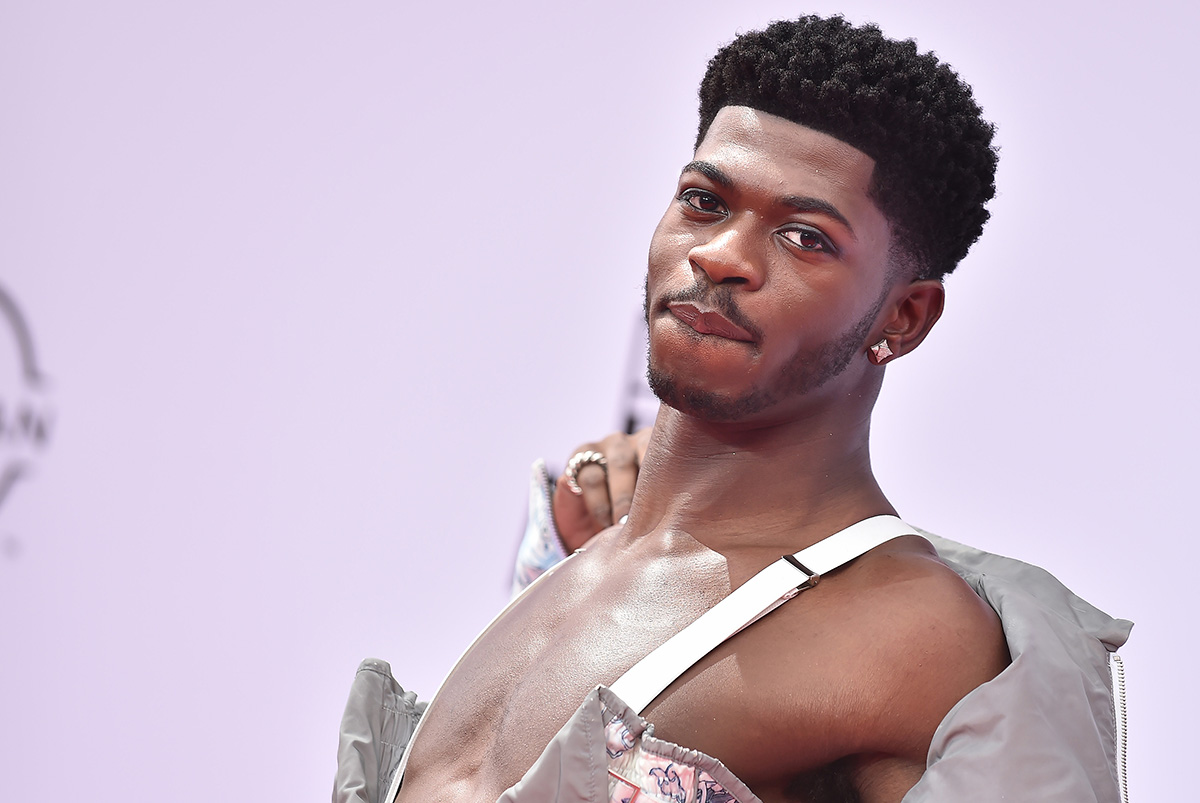
At a time when the world feels like it’s already choking on mouthfuls of disheartening news every day – genocide on the Gaza strip, climate crisis, political descent here and abroad – the last thing any of us want to hear about is another headline on a young star reportedly hospitalized following a possible overdose. Yet here we all are, watching a very familiar pattern unfold. This time, it’s our beloved queerby Lil Nas X.
According to TMZ, Lil Nas X, né Montero Lamar Hill, was reportedly hospitalized for a possible overdose mere months after he opened up publicly about how difficult the last few years of his career have been. He took to social media, stating, “I jumped straight into adulthood with extreme fame around me. So it was really nice to be just outside walking and meeting people in the streets and eating at restaurants, just even alone, spending a lot of alone time in solitude.”
Sound familiar? It should. The razzle-dazzling surface of fame seldom shows us the internal clutter and chaos, the pressure, the expectation to always be on, meanwhile mental health is brushed aside. And for our queer artists, particularly Black queer artists like Lil Nas X, the burden becomes that much denser.
We’ve seen this before. Demi Lovato. Aaron Carter. Whitney Houston. Talented, beloved artists who, for one reason or another, found themselves unraveling under the unrelenting scrutiny and chaos that comes hand in hand with fame. Some of them make it through. Some don’t. Many cry for help ages before things reach a breaking point. But what did we do? Did we listen? Did we leave Britney alone? Or are we the ones who light the match, pull out our phones, and film the flames? For once, please don’t tag me.
Lil Nas X sashayed onto the scene not just as a chart-topping artist, but as a cultural disruptor. Diva wore dresses to award shows. He clapped his cheeks on Lucifer in the music video for Montero. He vogued his way into the conversation on gender, sexuality, religion, and race that made a whole lot of folks uncomfortable, and that was the point. We were living for it, for him. We liked, we shared, and we reposted. We ate it tf up and licked our fingers clean. But did we ever truly care?
When a person like Lil Nas X steps out of the spotlight to say, “I’ve been having a hard time,” do we respond with any empathy, or just wait around for the next head turning lewk or satanic lapdance? It’s easy to forget that behind the headlines is a real human. One with a nervous system, a childhood, a family, and so much more. And, what most often goes ignored by all, a limit.
There is something particularly painful about seeing this happen to queer people in the public eye. We’re told that visibility is freedom. And to an extent, it is. Lil Nas X became a rare symbol of queer Black excellence in mainstream media, an unapologetic icon. But visibility without protection has the potential to be fatal. Fame doesn’t guarantee safety – not physically nor emotionally. As a matter of opinion, for queer people, it’s more often than not the opposite.
When you’re queer in the spotlight, you’re performing resilience first and music second. You’re expected to rise above, to remain unbothered, to smile at all times no matter the weight of the pressure, to be a walking teachable moment at every moment. And when you break down? People either turn their backs or turn you into a meme.
FACT: mental health in the queer community is already a crisis. Study upon study have consistently shown that LGBTQ+ identifying folks are at significantly higher risk for anxiety, depression, and suicide. Add international stardom to the mix, and you don’t get immunity from this. You get fast-tracked.
And yet, we continue to lap up these public struggles like entertainment. The media machine feeds on our thirst, and we keep clicking. Headlines about a “possible overdose” become the most clicked clickbait. Tweets become jokes. Vulnerability becomes viral.
So then we have the question, what does it mean to authentically support an artist like Lil Nas X, not just when he’s on stage, but when off stage as well? When the posts stop posting. When the glitter dulls. Are we prepared to support our icons through their harder times the way we do when they’re on top of the world?
We can start by changing how we engage. Honestly take a moment to ask yourself, are you clicking on these stories to gag or to understand? Are you giving compassion or commentary? Are you holding a mic to their cry for help, or are you fetishizing their struggle?
We also need to shine a light on the entertainment industry to offer real mental health resources and protections, especially for young and marginalized artists whose career they are both responsible for and profit immensely from. Care does not come hand in hand with fame. It’s often the reason care is a concern.
We don’t know the full story of what happened with Lil Nas X, and jumping to conclusions is like eating at Chick-fil-A: only those of low intellect are tempted. But what we do know is that someone allegedly ended up in the hospital after publicly saying they were struggling. That alone should be enough to warrant concern. Not for the gossip or clicks but for simple humanity.
Commentary
Over the Rainbow: The systemic rollback on LGBTQ+ Rights
From erasing rainbow crosswalks to defunded healthcare, queer communities are sitting front row to a coordinated effort to strip away decades of progress. Take this as a call to pay attention, and to action, before more rights quietly vanish.
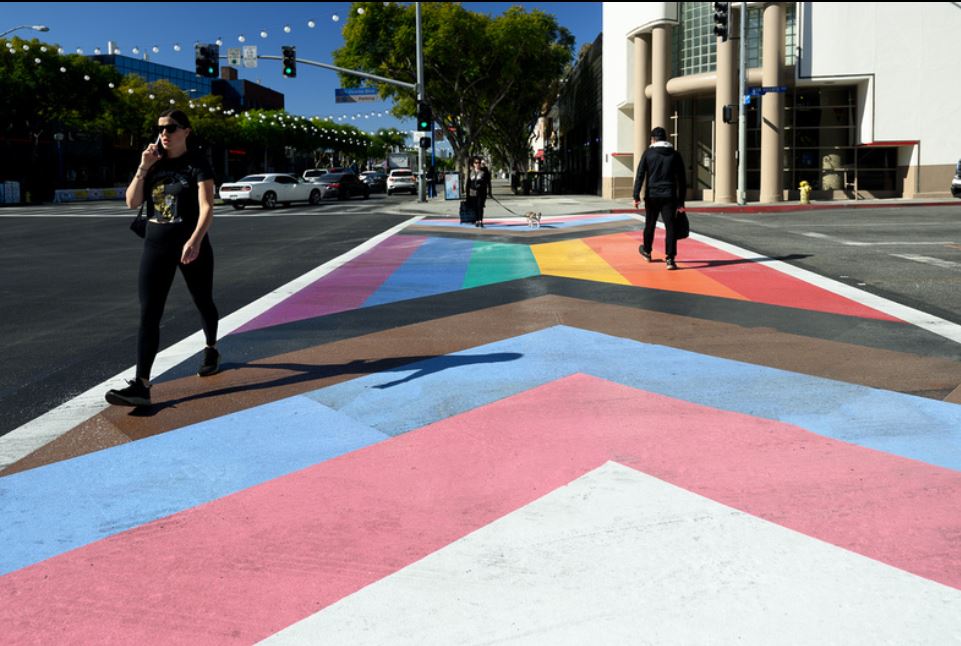
In the past decade, rainbow-clad crosswalks have popped up in cities across our country, serving as affirmations of long-overdue queer solidarity and resilience. But today, in more and more places, those colors are now being scrubbed away, painted over, and banned under new regulations. What may seem to some as an inconsequential repaving is, in reality, a call to action. It signals a shift away from inclusion, toward an erasure and the sanitizing of public spaces where visibility is becoming, once again, a luxury for select populations. This is not a simple matter of public art. It’s a matter involving power, belonging, and the right to exist as who we are.
Let’s see this for what it is. In stripping away our technicolor stripes, we also lose the unspoken sense of safety and acceptance that they provide to so many who need just that. Rainbows speak to an array of identities and experiences. Taking this away signals a return to conformity, and ultimately, invisibility. These crosswalks have long functioned as not just decoration but straight-up declarations. They say to LGBTQ+ pedestrians “You belong and you belong here.” Taking away these symbols actively communicates something just as loud yet far more bleak… “Not anymore.”
The erasure of Pride-themed crosswalks echoes a consistent pattern seen throughout American history where public symbols tied to marginalized groups are challenged, removed, or reframed under the gaslighting of neutrality and “tradition.” Just in the past few years, murals honoring Black leaders or giving voice to movements like Black Lives Matter have been vandalized, painted over, and removed after receiving backlash or through political pressure. In some cases, city officials have justified the removals by citing noncompliance with local ordinances or “divisiveness,” ignoring the reality that these images provide our communities with powerful affirmations of identity and solidarity.
Indigenous communities have faced similar symbolic erasure through the renaming of landmarks and suppression of their time-honored cultural practices. In some places in the States, school districts have banned Native regalia at graduation ceremonies using the argument that it conflicts with dress codes and willfully disregarding its deep- rooted significance. Still more, attempts to preserve monuments or language programs are frequently met with bureaucratic pushback, labeling these cultural expressions as “nonessential.” These moves are never one-and-done. They’re the first steps in a broader rolling back of visibility and voice. What starts with paint or policy often crescendos into something much much louder – unless communities recognize the signs early and step up .
Hillary Clinton recently sounded the alarm over the future of same-sex marriage in the United States, warning that the Supreme Court may soon “return the marriage issue to the states,” much like it did with abortion. In a stark comment that has since echoed across Queer advocacy circles both on and offline, Clinton advised LGBTQI+ couples to “get married now.” Clinton explained, “I don’t think they’ll undo existing marriages, but I fear they will undo the national right.” Her statement spotlights the sobering reality that rights once considered settled are no longer secure. Clinton is not simply politically forecasting here. In a way, she is calling us all to action, urging LGBTQ+ folks to safeguard what we can. Clinton’s words mirror a growing recognition that removing symbols – this time being our rainbowed crosswalks – tend to usher in judicial reconsiderations.
Meanwhile, Kim Davis – the former Kentucky county clerk who went to jail in 2015 for refusing to issue marriage licenses to same-sex couples – has petitioned the Supreme Court to overturn Obergefell v. Hodges. Davis, Represented by Liberty Counsel, argues that the landmark ruling is grounded in a flawed doctrine of substantive due process and describes it as a “legal fiction.” Liberty Counsel asserts that her First Amendment rights to religious freedom and free exercise were unjustly penalized, asserting that she should not have faced contempt, imprisonment, and a substantial monetary judgment just for simply “acting on her beliefs.” So this is where we are at.
In 2025, a sweeping wave of anti-LGBTQ+ policies has wrapped its talons around multiple levels of government, significantly lessening protections and visibility for queer and trans communities in our country. At the federal level, the Trump administration announced that starting in 2026, gender-affirming care will no longer be covered under the Federal Employees Health Benefits and Postal Service Health Benefits programs, affecting thousands of transgender federal workers and their families. Meanwhile, the Department of Education has labeled several Northern Virginia school districts, including Fairfax, Arlington, and Loudoun, as “high-risk” due to their upholding of inclusive policies for transgender students. These districts must now front over $50 million in education funding.
At the state level, hostility toward LGBTQ+ rights has swelled. More than 700 anti-LGBTQ+ bills have been introduced or passed in 2025 alone, targeting everything from flag displays to healthcare access. In Utah, Pride flags are now banned from government buildings, with daily fines imposed for noncompliance, while funding for Pride events has been drastically reduced. Nowhere is this oppressive legislative surge more aggressive than in Texas, where over 200 anti-LGBTQ+ bills have been introduced, including measures to restrict gender-affirming care, erase gender identity from official records, censor LGBTQ+ topics in schools, and redefine legal sex in rigid binary terminology. Stacked up, these developments represent a coordinated campaign to reverse decades of progress.
What can we do? First, we have to stay engaged. For starters, stop telling people that the news is too depressing to watch and find an outlet or three that resonate. Also, attend city council meetings, demand transparency from elected officials, and hold leaders accountable. Push for alternative expressions of support (public art, monuments, the whole gamut) that preserve the spirit of inclusion even when laws change.
Ultimately, we must amplify visibility. At a time in our country’s story where silence is easily mistaken for obedience, communities must get louder than ever in affirming their values. Take photos, tag photos, share stories, and call out those in places of power. Our rainbow crosswalks may be dropping like soldiers but the people they represent are still standing. Despite this bleak climate, WorldPride 2025 was held in Washington, D.C., doubling as both a queer-centric celebration and an indisputable act of protest against these escalating threats. Let’s keep that energy going, shall we?
In the end, what’s at stake is much greater than paint on pavement. It’s the affirmation that everyone deserves to be protected regardless of their identity. Let’s not wait until the last color is washed off our streets. Let’s repaint and resist. Let’s reimagine a country where all of us belong, every shade on that rainbow we hold so dear. We’re not red, white, and royally f*cked quite yet. Let’s make sure we never are.
Opinions
State Department’s new human rights reports are silent. We refuse to be
LGBTQ+ people ‘erased’ from 2024 report
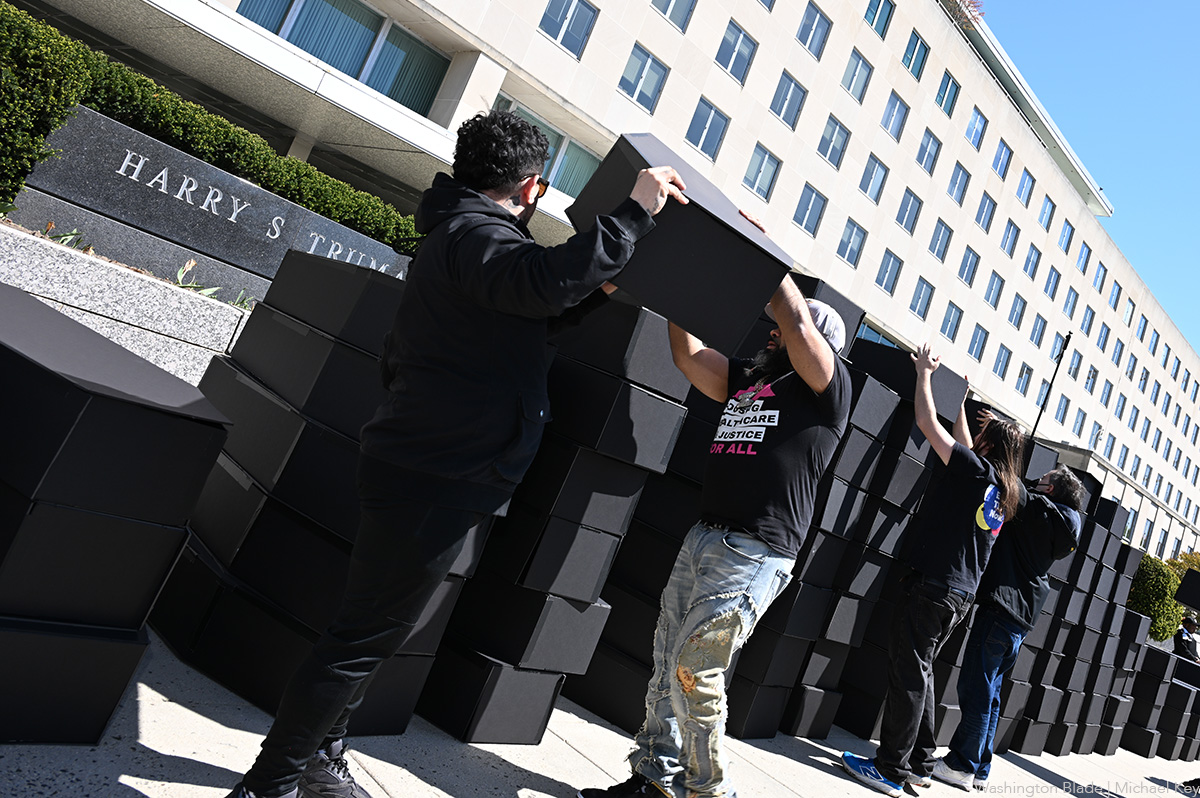
In Dhaka, Bangladesh, a young gay man who had traveled five hours to meet us at the U.S. ambassador’s residence spoke softly about the violence he endured. For years, activists like him would meet with U.S. officials to tell their stories, trusting our government to publish their truth for the world to hear. Last week, the Trump administration betrayed that trust and cast aside decades of bipartisan work. Instead of fair and accurate reporting, it systematically deleted almost all references to abuse and persecution of lesbian, gay, bisexual, transgender, queer, and intersex (LGBTQI+) people in the 2024 U.S. Department of State Country Reports on Human Rights Practices, known as the Human Rights Reports (HRRs).
Mandated by Congress since the 1970s, the HRRs cover every country in the world. They are an essential resource for courts, governments, and non-governmental organizations (NGOs) in evaluating human rights abuses, allocating resources, and crafting policy. Though the reports originally did not cover anti-LGBTQI+ violence, persistent education and advocacy from our community led Republican and Democratic administrations, including the last Trump administration, to document abuses based on sexual orientation, gender identity, and sex characteristics annually for the past two decades.
When we served as the Office of the U.S. Special Envoy for LGBTQI+ Rights, these reports were a priority. During our service, we reviewed and incorporated reporting from our embassies, the UN, NGOs, universities, media, and — most importantly — from survivors themselves. By the time we left government in January, every country’s report contained a dedicated, robust section documenting abuses against LGBTQI+ people.
These sections filled a void. They mapped where U.S. investments in human rights could do the most good, reinforcing work by human rights defenders, foreign governments, and allies to make the world safer for LGBTQI+ people. They helped asylum judges evaluate claims from LGBTQI people fleeing persecution. They told activists that their struggle was seen.
This year, the Trump administration did the opposite. After a long delay, they released them last week during the congressional summer recess in order to bury the truth. They erased whole categories of abuse and watered-down others, including against women and girls, workers, indigenous peoples, people of African descent, Roma, and LGBTQI+ people. The LGBTQI+ section was deleted outright. A keyword search across all the 2024 reports we’ve read yields almost nothing: no “LGBTQI+,” virtually no “sexual orientation,” no “gender identity,” no “intersex.” What few references remain are shortened, sanitized, and buried deep.
Read the 2024 chapters for Uganda and Russia, and you might believe there are no LGBTQI+ people or abuses in either country. But read the report from 2023 and you’ll see 45 reports of anti-LGBTQI+ abuses in Uganda and 36 in Russia. Clearly, it is not possible to resolve such systematic abuse in one year. Instead, our State Department just removed any reference to most of the most egregious abuses of LGBTQI+ people worldwide.
In Iraq, for example, parliamentarians passed an anti-LGBTQI+ law that equates homosexuality with “prostitution,” and punishes same-sex relations with up to 15 years in prison. But that law, reported on in 2023, gets no mention. Same in the Kyrgyz Republic, where a nationwide “LGBTQI+ propaganda” law forced a shutdown of perhaps the country’s oldest LGBTQI+ service provider. No mention. And, in Afghanistan, unspeakable acts of anti-LGBTQI+ violence and abuse at the hands of the Taliban, all reported last year, are gone too.
This erasure is deliberate. It tells authoritarian governments they can abuse minorities with impunity. It also signals to Americans that LGBTQI+ equality is negotiable here at home, too, landing just as the Supreme Court received a petition to overturn marriage equality.
But here is the truth: erasure has never defeated us. Visibility has always been our movement’s most powerful tool — and history shows it cannot be permanently denied. From Stonewall to marriage equality in the United States to countries around the world that have struck down sodomy laws and codified transgender rights, LGBTQI+ people have always overcome silence with courage and persistence. Across continents, when they try to erase us, we turn exclusion into progress.
The administration’s refusal to report on human rights abuses of LGBTQI+ people and other marginalized groups is a political act, not an accident. We urge you: call your U.S. senators and representatives today via the Capitol switchboard, (202) 224-3121, and ask them to confront the administration for failing to do its job on the HRRs and pass Senate bill S. 2611 mandating that future reports cover LGBTQI+ rights and other key categories. We urge other governments to expand their own reporting to rigorously document and condemn abuses. All of us can fill the gap by elevating high-quality data from NGOs, universities, and think tanks that are already setting the global standard for reporting on the status of LGBTQI+ people around the world.
The administration may rewrite its reports to fit its narrow view of the world, but it cannot erase the courage of those who tell their stories or the victories we have already won. Our history as LGBTQI+ Americans proves that visibility, once claimed, cannot be buried for long. The task before us is simple and urgent: to insist on truth, to defend it in every forum, and to carry it forward until equality is beyond erasure.
Jessica Stern is a Senior Fellow at the Carr-Ryan Center at the Harvard Kennedy School and co-founder and principal of the Alliance for Diplomacy and Justice, an organization co-founded by eight former ambassadors, special representatives, and special envoys advocating for human rights in U.S. foreign policy. She is the former executive director of Outright International and the former U.S. Special Envoy for the Human Rights of LGBTQI+ Persons.
Suzanne B. Goldberg is the Herbert and Doris Wechsler Clinical Professor of Law at Columbia Law School and former senior advisor in the Office of the Special Envoy to Advance the Human Rights of LGBTQI+ Persons.
Reggie Greer is a Global LGBTQI+ Fellow at the Harvard Kennedy School and a former Biden-Harris Administration appointee, serving as Senior Advisor to the U.S. Special Envoy to Advance the Human Rights of LGBTQI+ Persons as well as White House Director of Priority Placement and Senior Advisor on LGBTQI+ Engagement.
Commentary
Grindr’s glow‑up: What it means for queer pleasure and platform
Grindr has leveled up from flirty (and sometimes endless) chats to a full-on curated cultural platform for the sex positive queer community. Will it be the future of queer connection or a digital minefield waiting to detonate?

Cruising once meant lusty side-glances in our cities’ inconspicuous public parks, pubs, and even the phone booths at Macy’s. Nowadays it’s the far too familiar swipe, grammatically flawed DM, and the vast sea of headless torso pics. Grindr, once the ever so modest rosebud of today’s digital gay cruising, has now bloomed into so much more, upping its game with new features similar to other social media platforms, infusing it with AI matchmaking, and uncensored content under one rainbow‑tinted roof. Is the only connection that matters these days a decent Wi-Fi connection? Arguable.
Grindr’s legacy began as the grid‑style, location‑based hookup platform that we all know and love… to delete only to reinstall two days later. Simple, sexy, and surface-level satisfying. Today, however, Grindr is going under a bit of a nip/tuck. Infused with AI‑powered personalization (think of it like an AI wingman), global discovery (“Discover”) and travel tools like “Explore Heatmap” and “Travel Pass” that give you jet‑setting Gayborhood vibes in real time.
Already at play is the new feature Right Now, a lusty live‑feed not too different from a disappearing story on poppers – post a pic or text that vanishes after an hour – with users now able to signal, “get in me bro,” getting straight to the di… to the point.
But Grindr hasn’t stopped there. Queue Grindr Presents, a hot hot hot new in‑app content hub that offers all types of queer media like video series (hello, Katya’s Who’s The A-hole?), playlists, editorials, behind-the-scenes tour clips, and then some. A pinch of Instagram, a touch of TikTok, a mouthful of YouTube, all intertwined into our shiny new Grindr.
At the core, it’s your hookup app and a commune of queer media. Your one‑stop stop shop for one (hopefully) uncensored and fabulously fae content feed. Grindr describes it as “an unapologetically safe space where the community can be themselves, be heard, and be fabulous without fear of suppression.” Cool, yes, but what about the unfiltered side of that freedom?
With this digital facelift, Grindr Presents could quite possibly be a girthy gold mine. For adult content creators, it has the potential to be the new brightly lit stage for visibility to fuel income. Expand your brand beyond X, Bluesky, and other password‑protected peen-clad platforms. Get attention from a captive (and c*ck-hungry) audience right when they’re browsing for… connection.
For creators, the above-mentioned AI features help users reconnect. A‑List picks out your hottest yet perhaps more reluctant potential matches, giving creators more chances for recurring benefactors. Chat summaries allow casual viewers to re‑engage without repeating the same flirtatious verbiage. Meanwhile, global discovery tools have the potential to reach new audiences for your content without a passport or risking flying out from Newark.
Let’s talk about Sniffies for a moment. For those who are unfamiliar, Sniffies is our beloved map‑based cruising platform that didn’t bat an eyelash at explicit photos and mapped nearby users and cruising grounds worldwide. It made its iOS debut in March 2025 only to be yanked by Apple around late May due to “ongoing content restrictions” despite implementing a “Safer Work Mode.” The website remains, but the app was scrapped.
This brings up a deliciously delicate question: could Grindr face the same fate? Both Grindr and Sniffies cater to queer cruising, and both push sexual content boundaries of the status quo. The difference is that Grindr has been Apple‑approved to this day. It does have the authority to sanitize profile pictures (would you settle for PG-13?) and frames itself as “dating” as opposed to cruising or hooking up. Sniffies’ unapologetically overt purpose to get down likely was the catalyst for a multitude of sanitized corporate scrutiny whereas Grindr’s more nuanced facade was given the green light.
Still, with Grindr Presents delivering uncensored queer media, even if curated, the Apple gods might clutch their pearls. Particularly in our current political climate where queer content is increasingly met with rigid censorship. But Grindr’s mainstream status and framing as a “social hub” rather than purely pornographic might give it more freedom, for the time being at least.
With Grindr being so free from censorship and regulation, it teeters on the familiar fine line between freedom of speech from salacious to unsavory. Let’s look at X as an example, the same platform that gave voice to the Black Lives Matters Movement while also holding space for white supremacists. On one side of the coin, no censorship means creative freedom, raw authenticity, spontaneous connection, and radical queer expression. On the flip side, it opens the door for hate, trolling, fetishization, and unsafe content to flourish if left unchecked, especially for vulnerable communities.
Grindr’s task then is to enable expression without sliding into the waters of harmful content or hate speech. The platform’s safety, moderation, and responsibility will inevitably be tested. Without a watchful eye, Grindr Presents could become a megaphone for extremist and regressive voices, or at the very least, spotlight internal community biases. Yes, free speech is hot, but unmoderated speech can be a real buzzkill.
Only time will tell which trajectory Grindr is set on. Ignite an eruption of queer creativity and creator‑centric monetization, or get tangled in regulatory red tape, or worse, push back from within the community. Grindr has evolved from a quintessential hookup app into a multifaceted platform functioning as a gay social hub and media outlet. In today’s climate of growing anti‑queer censorship, the challenge will be striking a balance between moderation and freedom of expression.
So, sweet little cruisers, charge your iPhone, swipe that grid, and drop into Grindr Presents. Let your curated content ride the wave. The digital cruising scene is evolving, and Grindr is the savvy (and maybe scandalous) chauffeur ushering us into a new day and age of getting that d. Let’s buckle up and pop our PrEP. It’s gonna be a wild ride.
Commentary
Why California must remove the roadblocks to safer streets
West Hollywood City Councilmember John Erickson addresses interpersonal politics getting in the way of street safety, specifically on Fountain Ave.

By John M. Erickson, West Hollywood City Councilmember and Candidate for California
State Senate District 24
California is home to some of the most innovative thinkers and boldest visions in the world. We have led the way on human rights and climate change. Yet sometimes, interpersonal politics get in the way of implementing the simplest, most straightforward ideas—even when it means saving lives.
A glaring case in point is what is happening on Fountain Avenue—a street that twists and turns from Los Angeles through West Hollywood and has become a hazard that can easily be fixed by infrastructure changes, but has been caught up in a nonsensical process that has become more political than practical.
Since March 2021, just a few months after I was sworn in to the West Hollywood City Council, I authored legislation to redesign Fountain Avenue because of the weekly near-fatal or fatal accidents that occurred there. My proposal was straightforward: add protected bike lanes, widen sidewalks, and calm traffic so that people can move safely whether they’re walking, biking, or driving.
The council voted 5–0 in favor. The public supported it. Experts endorsed it. The need was beyond obvious.
And yet—here we are, six years after that first vote, and nothing has changed. The City Council has taken six separate votes just to approve a street design we unanimously agreed on in 2021. Why?
I believe it is because in our car-centric society, age-old ideas of public safety and interpersonal politics have gotten in the way of upholding the first responsibility of an elected official: to keep people safe. In the meantime, multiple people have been struck and killed by cars on Fountain Avenue, the most recent happening right across the street from my home. Every day we delay implementing the changes we approved years back, we are jeopardizing people’s lives, and as one public commenter said at our last city council meeting, the process is killing people.
This is not just a West Hollywood problem. This is a California problem. Across our state, commonsense projects that would make communities safer, greener, and more livable are caught in an endless tangle of redundant approvals, over-engineered reviews, and bureaucratic inertia. We’ve built a system that treats progress—even public safety—as something to be studied into submission rather than acted upon with urgency.
We need structural reform to change that. Here’s all it should take to make our streets safer for everyone:
- Set clear timelines for infrastructure changes—and stick to them. If a city council votes to
approve a project concept, the clock should start. Departments and agencies must meet
hard deadlines for design, environmental review, and groundbreaking. Endless “re-
authorizations” only add delay and cost lives and waste taxpayer money on this endless
cycle. - Limit duplicative votes. Six council votes for a single street project is absurd, and frankly,
maddening. All it should take is one vote to approve the concept, one vote to approve the
final design, and then build it. We need to get back into the business of doing things rather
than talking about them to death. - Empower staff to act. Once elected leaders set policy direction, professional staff should
be able to carry it out without returning to the council for permission every step of the way.
Accountability shouldn’t lead to paralysis. - Adopt “safe streets first” protocols. If a corridor is identified as high-injury, safety
improvements should be fast-tracked—not forced to compete with routine maintenance
projects for years on end.
I am working to implement these changes—not just for Fountain Avenue, but for every community waiting on a safer crosswalk, a protected bike lane, a new housing development, or a climate-resilient infrastructure project. Because if we truly value human life as we claim, our actions cannot sit idle in a staff report. They must mean more than cutting a ribbon or holding a vigil at the site of a fatal accident.
The time has come to take swift action to legislate the infrastructure change process, so that our actions can live up to our number one responsibility as elected officials: keeping the public safe, whether they are in a car, on a bicycle, or walking.
Opinions
Vacationing abroad with an embarrassment in the White House
President Donald Trump is a self-serving buffoon

SYRACUSE, Italy — It was shortly after 7 p.m. on July 22 when I left the beach and returned to my apartment in Ortigia, a small island in which Syracuse’s Old City is located, and turned on the television. An Italian newscast had yet another story about an AI-generated video on Truth Social that showed FBI agents arresting former President Barack Obama in the Oval Office as President Donald Trump watched.
“The Italian news all day has been reporting on Trump’s deep fake showing Obama’s arrest. Is that for real? And seriously WTF? 🤦,” I asked Washington Blade White House Correspondent Chris Kane in a text that I also sent to a mutual friend.
The video that Trump shared on his social media network was fake, but it was yet another example of our commander-in-chief embarrassing our country. Not even a two-week vacation in Italy could temper the embarrassment that I feel as an American with Trump in the White House.
There are myriad other examples of Trump embarrassing our country about which I have written while abroad. Here are some examples:
• I was on assignment in the Mexican border city of Tijuana on Jan. 28 when Trump suggested, without evidence, the Biden-Harris administration’s diversity, equality, and inclusion policies could have caused the midair collision of a U.S. Army Black Hawk helicopter and an American Airlines regional jet near Reagan National Airport that left 67 people dead.
• Trump on July 16, 2018, defended President Vladimir Putin during a press conference that took place in Helsinki after they met. I watched the spectacle unfold on television while I was on assignment in Mexico City.
“President Trump’s defense of Russian President Vladimir Putin on Monday after their summit in Helsinki was yet another moment when I felt embarrassed for my country while on assignment outside the U.S.,” I wrote in the Blade on July 19, 2018. “This ridiculous spectacle also proved once and for all the U.S. under this administration cannot claim with any credibility that it stands for human rights around the world.”
• Hurricane Maria on Sept. 20, 2017, devastated Puerto Rico. I was on assignment in Chile a few days later when Trump attacked then-San Juan Mayor Carmen Yulín Cruz. Our commander-in-chief later threw paper towels into a crowd at a church in Guaynabo, a suburb of the Puerto Rican capital.
“His outrageous attacks against the mayor of an American city who is doing everything possible to help her citizens survive are the latest in a long list of actions (or inactions) that have left this gay American journalist who routinely reports overseas embarrassed,” I wrote in the Blade on Oct. 2, 2017. “I am also increasingly ashamed to identify myself as an American while this man occupies the White House.”
I wrote in response to Trump’s exchange with Putin in Helsinki that American exceptionalism, “however flawed, teaches us the U.S. is a beacon of hope to those around the world who suffer persecution” and also “teaches us the U.S. is the land of opportunity where people can build a better life for themselves and for their families.” These ideals, seven years later, ring hollow.
A optimist may think the Trump-Vance administration should spend their time on far more important things: protecting transgender people from discrimination and violence, pressuring Israeli Prime Minister Benjamin Netanyahu and his government to stop committing what two prominent Israeli human rights groups this week described as genocide in the Gaza Strip, forcing Putin to stop his war against Ukraine, ensuring undocumented immigrants in U.S. Immigration and Customs Enforcement custody have access to due process, and negotiating in good faith with trading partners. A realist may conclude these aspirations are beyond reach with the Trump-Vance administration in the White House.
Trump clearly has his own aspirations. He is a self-serving buffoon who continues to embarrass his country in the eyes of the world.
-
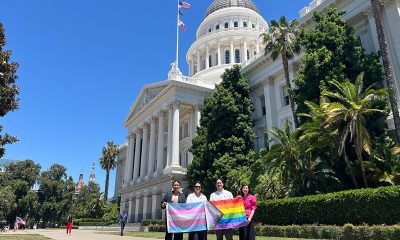
 Features1 day ago
Features1 day ago“We deserve to have a future here”: How we can support queer AAPI communities in 2026
-

 a&e features3 days ago
a&e features3 days agoQueer highlights of the 2026 Critics Choice Awards: Aunt Gladys, that ‘Heated Rivalry’ shoutout and more
-

 National3 days ago
National3 days agoTop 10 LGBTQ national news stories of 2025
-

 Events2 days ago
Events2 days agoGlowing tigers and butterflies will light up LA Pride’s first event this year at L.A. Zoo
-
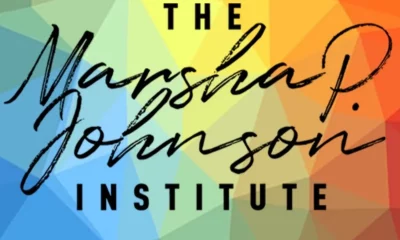
 LGBTQ Non-Profit Organizations1 day ago
LGBTQ Non-Profit Organizations1 day agoPassing the brick: How MPJI is centering Black and Brown trans voices
-

 Commentary7 hours ago
Commentary7 hours agoRepeal now, regret later: Section 230 is up for elimination, and it’s not the platforms who will pay the price
-

 Viewpoint2 days ago
Viewpoint2 days agoFrom closeted kid to LGBTQ+ journalist: queer community is my guiding light
-

 a&e features2 days ago
a&e features2 days agoLooking back at the 10 biggest A&E stories of 2025
-

 Movies1 day ago
Movies1 day agoTig Notaro & Zack Snyder’s hot lesbian action film
-

 Colombia1 day ago
Colombia1 day agoGay Venezuelan man who fled to Colombia uncertain about homeland’s future




